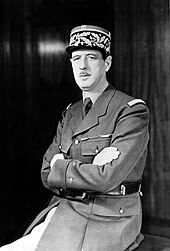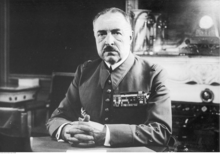Pierre Billotte
Pierre Armand Gaston Billotte (* 8. March 1906 in Paris ; † 29. June 1992 in Boulogne-Billancourt , Hauts-de-Seine department ) was a French general and politician , known for his merit in the Second World War to Compagnon de la Libération appointed has been. He was also a member of the National Assembly , member of the European Parliament , Minister for National Defense between 1955 and 1956 and Minister of State and Minister for Overseas Departments and Territories from 1966 to 1968 .
Life
Officer training, World War II and employees of Charles de Gaulle
Pierre Armand Gaston Billotte was the son of General Gaston Billotte , who was among other things military governor of Paris between 1937 and 1939 . After attending the Lycée de Bayonne and the Collège Stanislas de Paris, founded in 1804, he himself began an officer training at the Saint-Cyr military school in 1926 . After graduation he became a lieutenant (sous-lieutenant) and later first lieutenant (lieutenant) and was seconded to the general staff in 1933 after completing his training at the École supérieure de guerre . In 1935 he was promoted to captain (capitaine) .
Pierre Billotte took part in the Second World War as a member of a tank regiment and was taken prisoner of war by Germany on June 12, 1940 , whereupon he was interned in the officers' camp (Oflag) II D Groß Born in Western Pomerania . In the winter of 1940/1941 he managed to flee to the Soviet Union , where he was interned with two hundred French in the Michurin camp. After the German attack on the USSR on June 22, 1941, he asked in vain to fight in the Red Army . He then became a representative of Free France ( France Libre ) in Moscow . After a few months, he was exchanged with other French people for Soviet citizens who had returned from Greenland .
He then traveled on a ship from Arkhangelsk on a ship of the Royal Navy to London , where he joined General Charles de Gaulle . Between 1941 and 1942 he was first director of the military cabinet and then from 1942 to 1944 he was secretary of the Committee for National Defense (Comité de défense nationale) . In August 1944 he became the commander of a tank brigade (brigade blindée) belonging to General Jacques-Philippe Leclerc de Hauteclocque's 2nd Panzer Division ( 2nd division blindée ) and took part in the liberation of Paris (August 19-25, 1944). In September 1944 he was promoted to Brigadier General (Général de brigade) and on September 27, 1944 commander of the 10th Infantry Division (10e division d'infanterie) . With this he took part as part of the First Army ( 1ere armée ) , took part in the Battle of Colmar and was then appointed governor of the Rhineland . On December 3, 1945 he became Deputy Chief of the National Defense Staff (chef d'Etat-major adjoint de la défense nationale) . For his services in the Second World War, he received several awards, such as Compagnon de la Liberation and owner of the Croix de guerre 1939–1945 and the Médaille des évadés .
Postwar Period, Fourth and Fifth Republic
Member of the National Assembly

On March 5, 1946, Pierre Billotte was promoted to major general (général de division) and shortly afterwards to head of the French delegation to the United Nations Staff Committee . He was also President of the Council for the first negotiations on the Atlantic Pact . In early 1950, however, due to disagreements with government policy, he resigned from his posts and returned to Paris. The President of the Republic , Vincent Auriol , attempted to dissuade him from resigning during a private audience. He then became involved in the politics of the Fourth Republic and in July 1950 he joined the RPF (Rassemblement du peuple français) founded by de Gaulle and became a member of its executive committee.
As a candidate for the RPF, Billotte was elected member of the National Assembly with 30,776 votes in the elections of June 17, 1951 in the Côte-d'Or department . In the National Assembly he was a member of the Foreign Affairs Committee (Commission des affaires étrangères) . He was also between 1954 and 1955 a deputy member of the coordination commission for the examination of problems with the associated states of Indochina and on March 10, 1955 also a member of the coordination committee for atomic energy and nuclear research. He devoted himself mainly to questions of national defense and was the author of several reports on the ratification of the North Atlantic Treaty and on the ratification of the Paris Treaty on the accession of the Federal Republic of Germany to NATO in December 1951. His most important speeches included the speech on January 24th 1952 to discuss the law on the accession of Greece and Turkey to the North Atlantic Treaty. Although he welcomed the strengthening of the alliance in favor of strategic operations in the Mediterranean, he regretted that the French government had not been sufficiently committed to a regional Mediterranean pact. For this reason he advocated negotiations with Tunisia and Morocco .
From 1952 to 1954 his speeches in the National Assembly were marked by his struggle against the European Army project . On February 12, 1952, he denied in detail the strategic and political considerations on which this project was based and which would enable Germany to restore its old power. On March 6, 1952, he was one of the 27 RPF MPs who supported the election of Antoine Pinay as prime minister . This support led to a split in the RPF in July 1952, whereupon he became one of the leaders of the new Alliance of Social Republicans ARS (Alliance des républicains sociaux) . On March 28, 1952, during the discussion on the law ratifying the peace treaty with Japan , he declared the Gaullists' abstention . Similarly, the discussion of the Law on the Development of National Defense Credits on June 12, 1952, gave him the opportunity to speak again against the creation of the European Army. On November 20, 1953, Pierre Billotte again developed a concept of a confederal Europe that guarantees both the interests of Europe and those of France. He denounced the projects of supranational sovereignty that would deprive France of its rank as a great power and stressed the need to adapt the French economy to this new economic framework. In the course of the Indochina War , in a speech on March 17, 1954, he denounced the poor material situation of the officers and the associated difficulties in improving the quality of executive recruitment.
Ministers and re-elections to the National Assembly

Pierre Billotte's experience led him to become Minister for National Defense and the Armed Forces (Ministre de la défense nationale et des Forces armées) in the Faure II cabinet on October 6, 1955, as the successor to Pierre Kœnig . However, he only remained in office until February 1, 1956, after the government lost the vote of confidence in the National Assembly on November 29, 1955 and Prime Minister Edgar Faure then offered to resign. In the subsequent elections to the National Assembly, he applied as the top candidate for the list Union des indépendants d'action démocratique et paysanne . However, he received only 17,746 votes and thus missed his re-election as a member of the National Assembly.
In the Fifth Republic , Billotte was re-elected a member of the National Assembly as a candidate for the Union pour la Nouvelle République-Union Démocratique du Travail (UNR-UDT) for the Paris department and was a member of the National Assembly until he resigned on February 8, 1966. A month earlier, on January 8, 1966, he was appointed Minister of State and Minister for Overseas Departments and Territories (Ministre d'Etat chargé des départements et Territoires d'outre-mer) in the Pompidou III cabinet . He became a member of the National Assembly in the Val-de-Marne department as a candidate for the Union des Démocrates pour la Ve République (UDR) on March 12, 1967, and was a member of the National Assembly until he resigned on May 7, 1967. A month earlier, on April 7, 1967, he was appointed Minister of State and Minister for Overseas Departments and Territories to the Pompidou IV cabinet , to which he was a member until May 31, 1968.
After leaving the government, Billotte was re-elected to the National Assembly on June 23, 1968 in the Val-de-Marne department for the Union pour la défense de la République (UDR). In the subsequent election he was re-elected to the National Assembly on April 2, 1973 for the Union des démocrates pour la République (UDR) in the Val-de-Marne department, to which he was a member until April 2, 1978.
Web links
- Entry on the homepage of the National Assembly
- Entry in Generals of World War II
- Entry in Rulers
- France: Ministries in Rulers
Individual evidence
| personal data | |
|---|---|
| SURNAME | Billotte, Pierre |
| ALTERNATIVE NAMES | Billotte, Pierre Armand Gaston (full name) |
| BRIEF DESCRIPTION | French general and politician, member of the National Assembly and Minister |
| DATE OF BIRTH | March 8, 1906 |
| PLACE OF BIRTH | Paris |
| DATE OF DEATH | June 29, 1992 |
| Place of death | Boulogne-Billancourt , Hauts-de-Seine department |

